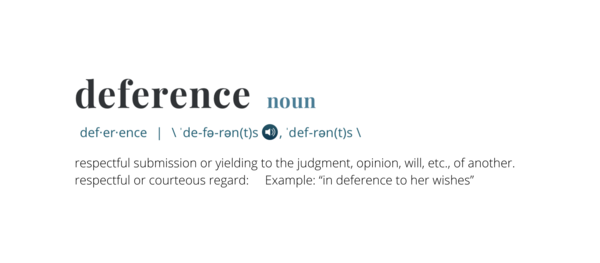A Time to Defer


Martin Luther, the great reformer, was a bull-in-a-China-shop type of guy. His enemies referred to him as the “fox arisen seeking to destroy the vineyard,” and “the wild boar of the forest.” A man of great courage and conviction, Luther refused to compromise his conscience even at the cost of his life. He was also known to be quite tempestuous, and some of the adjectives used by his contemporaries to describe him were vulgar, reckless, and bombastic. John Calvin once spoke of Luther’s “uneasy temperament which is apt to boil over in every direction.”
But then he got married. Katharine von Bora was a feisty red head who brought a mellowing effect upon the ardent reformer. The former nun, fifteen years younger than Luther, proved to be just as strong and passionate as he. Together they displayed the beautiful complementarianism that God intended in marriage. He came to lean on her for many things and of their home life Luther simply said, “In domestic affairs I defer to Katie. Otherwise, I am led by the Holy Spirit.”
While this is certainly becoming more counter-cultural, no husband should ever defer to his wife in matters of conscience or when a biblical conviction is at stake. This is what Luther meant when he said, “Otherwise, I am led by the Holy Spirit.” Christian men today desperately need to understand that God charges them with the spiritual leadership of their households, and that loving your wife “as Christ loved the church” does not require them to yield their place of headship within the home.
For the Luther family, certain responsibilities were best deferred to Katie’s strengths, but spiritual leadership always remained his responsibility. He would have never violated his conscience on this front just to appease his wife. When men do that, they’re not showing deference nor are they leading, they’re sinning. On the other hand, showing deference is a beautiful way to demonstrate the partnership God intended in marriage. Here are three good reasons to defer to your wife when it is acceptable to do so.
1. It displays honor and respect.
Deference is not the same thing as submission because it’s possible to submit without respect. When you defer to your wife you acknowledge her worth, her talents, her gifts, and her opinions. Choosing to give up your agenda for hers communicates value and respect. It’s also a statement of trust and reinforces her own sense of worth.
2. It displays a sense of strength.
Deference to your wife not only displays honor and respect, it also demonstrates your strength as a husband. It says you’re not threatened by her choices, nor do you fear her opinions. Deference is always given with the acknowledgment that it doesn’t have to be. There are two kinds of weak men: those who bully their wives and those who are bullied by them. Men who are secure in their God-given role may willingly yield to their wives without compromising their manhood.
3. It displays the partnership that marriage is supposed to be.
When husbands and wives show deference to one another it should always be a win-win situation. If I know my wife is better at organizing, (and she most definitely is) then allowing her to exercise that strength will benefit us both. When exercised in love and with a clear conscience, deference has the power to maximize the strengths of each partner.
Martin and Katherine Luther enjoyed a wonderful married life because he willingly deferred to her in domestic affairs. However, as he said, “to go against conscience is neither right nor safe.” Men, don’t ever sacrifice what you believe is right even if it goes against the wishes, choices, or opinions of your wife. You will not only fail her, but your God as well.